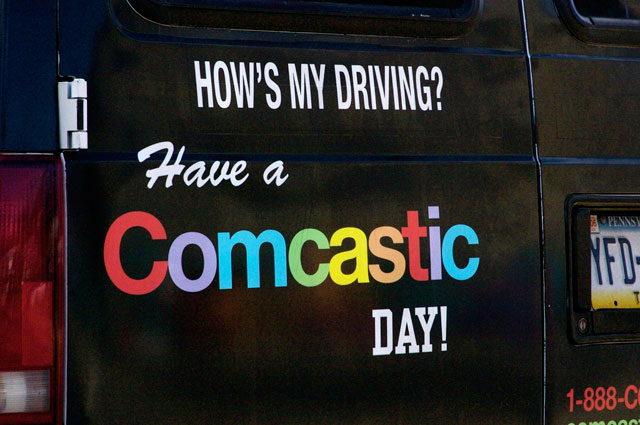If you ever want to find a skull-crushingly stupid opinion on anything, you normally need look no further than articles written by assorted Forbes contributors. And sure enough, Forbes has now published an article by one Doug Brake that argues that the proposed Comcast-Time Warner Cable merger is really awesome for consumers and that the only people who are making a stink about it are a bunch of “paranoid bloggers.”
“It is popular, especially in the blogosphere, to automatically distrust cable and telecommunications companies, a stance that often leads to inaccurate statements and misunderstandings,” Brake intones at the start of his piece, which sets the tone for the high-and-mighty sermonizing that he delivers throughout.
Of course, anyone who has ever subscribed to Comcast or Time Warner Cable knows that it isn’t just unwashed bloggers who “automatically distrust” those two companies — it’s pretty much everyone. Multiple surveys have shown that Comcast and Time Warner Cable are two of the most hated companies in the entire U.S. and it’s really not hard to figure out why: They deliver terrible customer service, their services are horrendously overpriced and they seem to love coming up with clever new ways to shake down customers through all sorts of sneaky fees.
Elsewhere in his piece, Brake sternly lectures us about how amazing the state of broadband competition is in the United States by pointing out that Verizon FiOS exists while never mentioning that Verizon has said that it isn’t going to build out its service any further. He also delivers a truly side-splitting line about how we shouldn’t forget that we can always use wireless services such as Verizon and AT&T for our home Internet connections even though they impose stiff data caps. And finally, he says that we shouldn’t write off the power of RCN, the cable company that is “operating in Boston, New York City, Chicago, Washington, D.C., and Philadelphia.”
OK, so funny thing about RCN. In my neighborhood in Boston, my friends and I have been begging them, positively begging them, to come serve our area for the past two years because we desperately want to get rid of the pestilence that is Comcast. When we’ve called them they’ve repeatedly informed us that they don’t serve our areas and… this is the most mind-blowing part… they’ve told us to call Comcast.
Now really, think about that for a second. What self-respecting business not only refuses to come in and serve people who are pleading for their service but actually hands over the phone number of their closest “competitor?” Can you imagine John Legere apologizing because T-Mobile delivers a crappy signal to your apartment and recommending that you give AT&T a ring instead? It’s stuff like this that makes American consumers think that the market for home broadband is laughably uncompetitive, not the crazed ramblings of a few paranoid bloggers.
So yes, the Comcast-Time Warner Cable merger is going to be a hard sell with the public because people are smart enough to know that letting two hated companies become an even bigger, more powerful hated company is not a good thing. For anyone who’s ever subscribed to Comcast or TWC, news of their merger is the equivalent of learning that Godzilla has decided to acquire Mothra to create one giant city-destroying hell beast.
The difference here, though, is that Godzilla and Mothra at least respect their victims’ intelligence enough to not try to convince them that their impending merger is “good for consumers.” Forbes contributors, on the other hand, aren’t so easily shamed.






